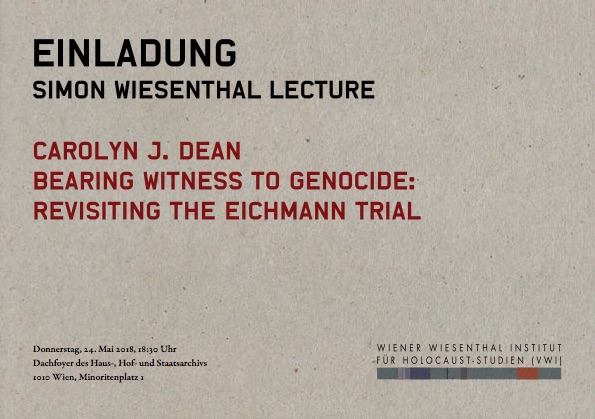Simon Wiesenthal Lectures
Die regelmäßig, alle sechs bis acht Wochen stattfindende Vortragsreihe, setzt sich zum Ziel, mithilfe renommierter Wissenschaftlerinnen und Wissenschaftler die aktuellsten Forschungsergebnisse zum Holocaust sowohl einem Fach- als auch einem breiteren Publikum zu präsentieren – und dabei das beeindruckende Spektrum dieser Disziplin, die zahlreichen Frage- und Problemstellungen von der empirisch-analytischen Historiografie bis zu kulturwissenschaftlichen Themen, jüngere Forscherinnen und Forscher ebenso wie bereits arrivierte, zu berücksichtigen.
Die Vortragsreihe der Simon Wiesenthal Lectures hat sich seit 2007, noch in der Aufbauphase des Wiener Wiesenthal Instituts für Holocaust-Studien (VWI), damals in Zusammenarbeit mit dem Dokumentationsarchiv des österreichischen Widerstandes und dem Institut für Zeitgeschichte der Universität Wien, als tragendes Element der Vermittlung neuerer wissenschaftlicher Ergebnisse im Bereich der Holocaustforschung bzw. der Holocaust- und Genozid-Studien zum Flaggschiff der Vermittlungstätigkeit des VWI entwickelt.
Über ein Jahrzehnt bot das Österreichischen Staatsarchiv im Dachfoyer des Haus-, Hof- und Staatsarchivs großzügigerweise den Simon Wiesenthal Lectures Obhut. Während den herausfordernden Jahren der Pandemie wurden die Lectures online abgehalten. Ab Herbst 2022, um weitere Publikumsgruppen zu erschließen, konnte mit dem Wien Museum eine neue Kooperationspartner gewonnen werden. Bis zur Wiedereröffnung des Hauptstandortes am Karlsplatz werden die SWL im MUSA, Felderstraße 6-8, neben dem Wiener Rathaus stattfinden.
| Simon Wiesenthal Lecture | |||
| Carolyn J. Dean: Bearing Witness to Genocide. The Adventures of a Moral Concept during and since the Eichmann Trial | |||
Donnerstag, 24. Mai 2018, 18:30 - 20:00 Dachfoyer des Haus-, Hof- und Staatsarchivs, 1010 Wien, Minoritenplatz 1
|
|||
This lecture addresses how “bearing witness to genocide” became a central trope of contemporary Western moral culture. The 1960/61 trial of Adolf Eichmann in Jerusalem put victims of genocide centre-stage and affirmed the pre-eminence of the Jewish Holocaust survivor in European and especially American politics and culture. The lecture revisits the Eichmann trial to understand its contribution not simply to bringing the world’s attention to the Jewish dimension of the Holocaust, but also to understanding how the trial shaped the pervasive figure of the Jewish “witness” who marked the Holocaust as a caesura in human history. The Holocaust survivor remained the iconic witness even when, after the 1990s, the witness to genocide became a more generic symbol of suffering humanity in the shadow of all state-sponsored mass violence against persons and cultures. The lecture suggests that only by placing the witness to genocide in a longer historical trajectory can we understand why the Holocaust remains iconic in spite of the occurrence of many other genocides since. Carolyn J. Dean is Charles J. Stille Professor of History and French at Yale University. She is a cultural and intellectual historian of modern Europe and the author of five books, including The Fragility of Empathy after the Holocaust and Aversion and Erasure: The Fate of the Victim after the Holocaust. Her forthcoming book, From the Survivor to the Activist: Bearing Witness to Genocide in the Twentieth and Twenty-First Centuries, will be published with Cornell University Press in early 2019. This lecture is a part of that work, which traces the emergence and transformation of the witness to genocide from inter-war trials in France and Germany, before the crime had a name, until the 1990s, when the witness to genocide appeared in the International Criminal Court and throughout various media. |
|||








